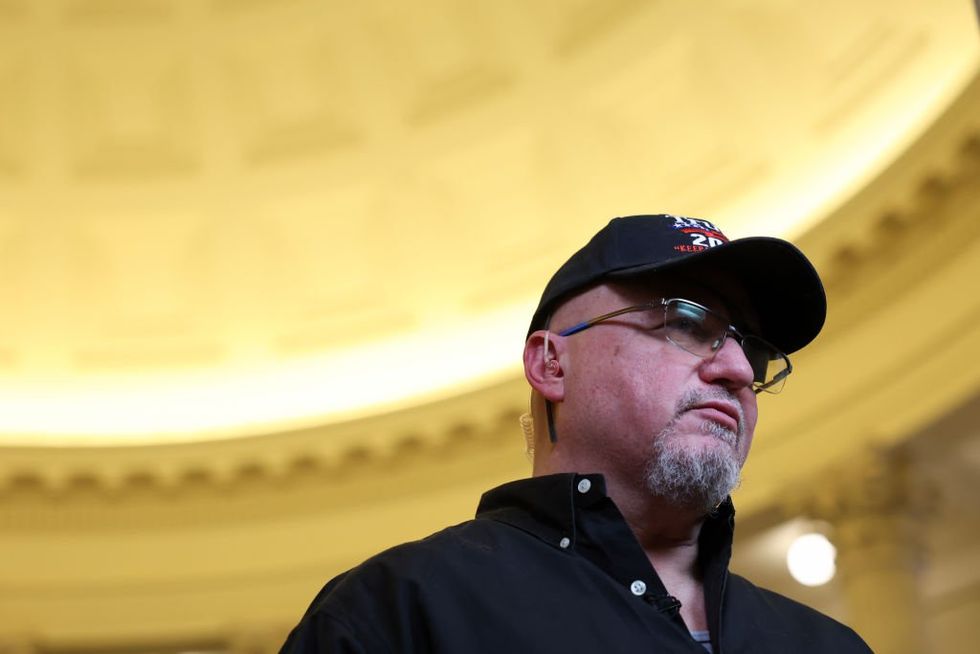
Oath Keepers founder Stewart Rhodes outside the D.C. jail on Jan. 22, 2025. Photo by Roberto Schmidt/AFP via Getty Images

US Attorney Edward Martin tells Judge Amit Mehta he does not have authority to change conditions of release because commutations end the cases.
The new U.S. Department of Justice moved to vacate probation terms and conditions of eight Oath Keepers and one associate, arguing that President Donald J. Trump’s commutation issued Jan. 20 puts an end to both incarceration and any supervised release.
United States Attorney Edward Martin filed a motion Jan. 24 shortly after U.S. District Judge Amit Mehta issued an order modifying the terms of release for the nine defendants that banned them from visiting Washington, D.C., or the U.S. Capitol without his permission.
“If a judge decided that Jim Biden, General Mark Milley, or another individual were forbidden to visit America’s capital — even after receiving a last-minute, pre-emptive pardon from the former president — I believe most Americans would object,” Martin said in a statement. “The individuals referenced in our motion have had their sentences commuted — period, end of sentence.”
'As the terms of supervised release and probation are included in the "sentences" of the defendants, the Court may not modify the terms of supervised release.'
After being released from a Maryland federal prison Jan. 20, Oath Keepers founder Elmer Stewart Rhodes III went to the District of Columbia jail to check on Jan. 6 defendants who were still being held. He later went to Capitol Hill to talk to lawmakers about Oath Keeper Jeremy Brown, who was pardoned by President Trump but is still being held.
“The defendants, however, are no longer subject to the terms of supervised release and probation, as the Executive Order ‘commute(d) the sentences’ of these defendants,” Martin wrote in his motion. “As the terms of supervised release and probation are included in the ‘sentences’ of the defendants, the Court may not modify the terms of supervised release; the term is no longer active by effect of the Executive Order.”

Rhodes told Blaze News that as he was being discharged from FCI Cumberland prison in Maryland, staff told him he was still subject to probation. Rhodes went to Washington, D.C., on Jan. 21 to seek more information from U.S. Probation and Pretrial Services.
Terms of release in criminal cases are often pages long. For instance, Rhodes’ terms of release prohibit him from using social media of any kind without permission from his probation agent. He cannot travel outside his home district without permission, must consent to a government search of his computers at any time, and is barred from using apps such as Skype, Nintendo Switch Online, PlayStation Network, and others.
Rhodes was convicted of seditious conspiracy, obstruction of an official proceeding, and tampering with documents and was acquitted of conspiracy to obstruct an official proceeding and conspiracy to prevent members of Congress from discharging their duties. Judge Mehta sentenced Rhodes to 18 years in prison followed by three years of supervised release.
Many Jan. 6 defendants who received pardons or sentence commutations were ordered to pay restitution to the Architect of the Capitol and medical expenses of police officers, while others were issued huge fines equaling money they raised online to pay legal expenses or assist with family costs.
The nine Oath Keepers-related defendants who received commutations include Rhodes, Kelly Meggs, Kenneth Harrelson, Jessica Watkins, David Moerschel, Roberto Minuta, Edward Vallejo, Joseph Hackett, and Thomas Caldwell.
From the minute President Trump announced he was signing pardon paperwork and commutations affecting more than 1,500 Jan. 6 defendants, Martin began filing motions to dismiss cases with prejudice, meaning the charges cannot be refiled. The dismissal orders affected defendants whose cases had not yet been resolved and some who have served their prison terms already.
Terminally ill cancer patient and defendant Michael Fitzgerald, featured in a Blaze News story in October, had his case dismissed by U.S. District Judge Paul Friedman, but the judge would not include the “with prejudice” language.
Other judges attached footnotes and made sharply critical statements against President Trump in their orders to dismiss cases. Judge Tanya Chutkan stated that “no pardon can change the tragic truth of what happened on January 6” and cannot “whitewash the blood, feces, and terror that the mob left in its wake.”
Judge Beryl Howell penned an eight-page memorandum and order in the case of Nicholas DeCarlo and Nicholas Ochs, saying the men admitted to “egregious criminal conduct.” She described protesters and Jan. 6 defendants as “poor losers.”
Judge Howell ripped the language in President Trump’s proclamation, in which he stated his executive action “ends a grave national injustice that has been perpetrated upon the American people over the last four years and begins a process of national reconciliation.”
“No ‘national injustice’ occurred here, just as no outcome-determinative election fraud occurred in the 2020 presidential election,” Judge Howell said. “No ‘process of national reconciliation’ can begin when poor losers, whose preferred candidate loses an election, are glorified for disrupting a constitutionally mandated proceeding in Congress and doing so with impunity.”
Like Blaze News? Bypass the censors, sign up for our newsletters, and get stories like this direct to your inbox. Sign up here!